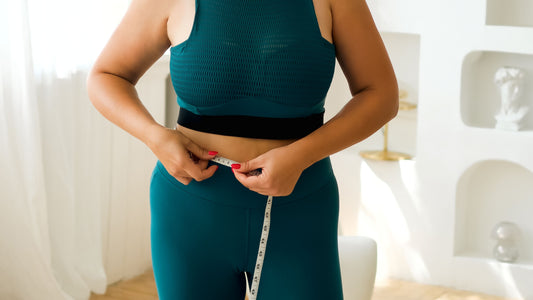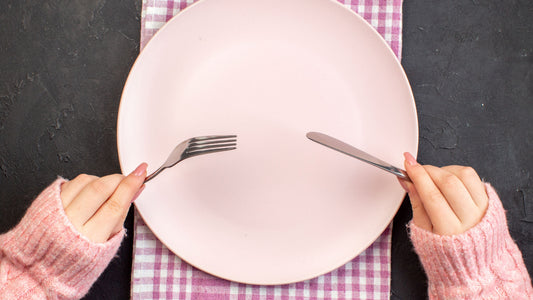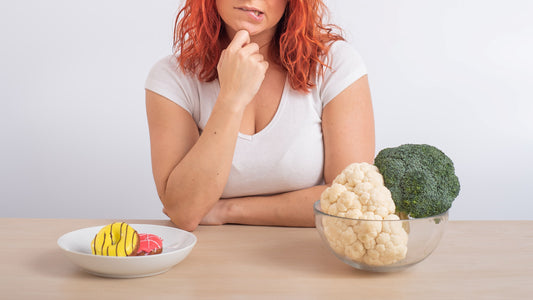I’m a toned size 12, and at 5’ 9,” I’m at my happy weight, just under 140. But every now and then, parts of my body – namely my tummy, fingers, and ankles – mysteriously swell up. My slacks or skirts or skirts feel tight, and it’s hard to remove my rings.
I, like many women, sometimes suffer from bloating, also called water retention or edema. It’s not as if the symptoms are life-threatening, but I find bloating both frustrating and demoralizing. Apparently, I’m not alone. According to a 2012 study reported in the International Scholarly Research Notices: Gastroenterology, 10 to 25 percent of healthy people frequently experience bloating.
We women have an increased risk of water retention and temporary weight gain, especially around our periods and during menopause. There are reasons why, and the good news is that you can banish bloat with diet and other natural remedies. I’ll fill you in, but first, here are the reasons behind the bloating.
If you’re still menstruating, you run the risk of water retention due to the rise and fall of hormones right before your period. Sometimes, that extra fluid can register 5 to 10 extra pounds on the scale!
The main hormonal influence is estrogen. It affects the sodium and water balance in your body. With rising estrogen, the less sodium and water pass through your kidneys, so the more water your body retains. The bloating usually lasts only a few days and will subside as your period starts when estrogen dips to its lowest point.
During menopause, fluid gain is related mostly to falling progesterone levels – which also signal the kidneys to retain water and sodium.
There are other conditions that cause bloating, especially in the belly, and these generally are a result of constipation and feeling gassy. But not to worry about any of this! I’ve got several tricks up my sleeve, that if you make part of your lifestyle, you’ll rarely suffer from bloating and gas.

- Stay hydrated. It sounds counter-intuitive, but the more water you drink, the better you stave off water retention. Your kidneys need a constant supply of water to properly eliminate fluids and waste products from your body. If water is in short supply, the kidneys tend to hoard water, and bloat can set in.
My rule of thumb is this: Drink 60 to 70 ounces of pure water daily. Use common sense though, if you’re a marathoner competing in the heat you need more, and if you’re a sedentary worker, you probably need less. Be sure to read my blog, Boost Your Liquid Assets: 5 Hydrating Tips for a Healthier You.
- Stay away from refined carbs. Eating sugary and processed carbs such as candy, sweets, white flour, bread, chips, cakes, and so forth leads to spikes in insulin levels. High insulin levels cause your body to hold on to more sodium – which in turn increases the fluid volume inside your body. Stick to natural foods such as proteins, vegetables (especially greens), low-sugar fruits, and healthy fats.
When you curtail carbs, as I recommend on my Keto-Green diet, your body begins to burn stored carbohydrates (glycogen) for energy. Glycogen is stored with water, so when you curb carbs, water doesn’t have anything to hold on to, so it’s readily released from the body. Therefore carb restriction causes you to lose water weight. Which is fine. Water is weight, too, and no one likes the bloat it causes.
- Increase your magnesium intake. This versatile mineral (it’s involved in more than 300 enzymatic reactions in the body) may help fight water retention. One study published in the Journal of Women’s Health in 1998 found that just 200 milligrams of magnesium daily reduced fluid gain in women with PMS. Besides eating rich sources of magnesium such as nuts, dark chocolate (my favorite), and leafy greens, consider supplementing with this mineral. I recommend 250 milligrams (or up to 1,000 milligrams) taken before bedtime (magnesium helps you sleep better). Following an alkaline diet like my Keto-Green way prevents deficiencies of magnesium. My Couch Talk with Ian Clark discusses The Importance of Magnesium. Check it out!

- Supplement with probiotics. Probiotics are friendly bacteria in supplement form that empower a healthy gastrointestinal tract. An imbalance of good and bad bacteria in your gut can increase levels of an enzyme called beta-glucuronidase, which in turn triggers reabsorption of estrogen back into circulation. This leads to estrogen dominance, a condition in which you have insufficient progesterone to balance the effects of estrogen in your body. There are numerous symptoms as a result, including bloating and gas. Taking a probiotic supplement daily, preferably before bedtime such as my Puro Probio Max can prevent these issues. For more information, see my blog Nourishing Your Gut for a Healthier You.
- Eat more potassium-rich foods. Potassium is a natural diuretic – in two ways. It helps decrease sodium levels (which cause water retention) and steps up urine production. Two high-potassium foods on my Keto-Green diet are avocados and tomatoes. Enjoy them abundantly.
- Reduce your sodium intake. Too much salt in your diet also makes your body hold on to too much water. Barely salt your food and try to use less than a half a teaspoon when fixing your meals. If you miss the taste of salt on your food, try a salt substitute or experiment with various herbs and spices in your cooking. The amount of salt the body can handle varies from person to person.
- Stay aerobically fit. Cardio exercise can have a dramatic effect on preventing water retention. How? It restores resiliency to your blood vessels. Without resiliency, extra water can flow from them and collect in the tissues, causing water retention. Cardio workouts such as walking, jogging, and bicycling improves the resiliency and tone of blood vessels. I just published an informative blog on exercise – Exercise in Perimenopause, Menopause, and Post-Menopause. It offers some great workout advice for every stage of your life.
In rare cases, water retention can be caused by a medical problem such as kidney disease or heart failure. If you’re chronically plagued by this condition, or it comes on suddenly, have it checked out by your doctor.
Normally, there’s really nothing to worry about. Thankfully, you can prevent bloat from getting in the way of having a trim, sexy, and healthy body.

Cauliflower Mashed Potatoes
Makes 4 servings
Ingredients:
- 1 to 2 head organic cauliflower (depending on size), stem removed
- 3 to 4 tablespoons butter or ghee
- ½ teaspoon sea salt
Directions:
- Boil the cauliflower with the salt. When soft, add butter and mash well. Add more butter if desired. Salt and pepper to taste. You will love this over mashed potatoes from now on and feel even better after eating it!
P.S.Ever find yourself wondering if you're really making any progress?
I've found over the years is that the key to real results is keeping track of your progress. Use these Urinalysis Test Strips to start tracking your body's pH so you know for sure if you are on track to less bloating, healthy fat loss, and balanced hormones. Get your own here!



